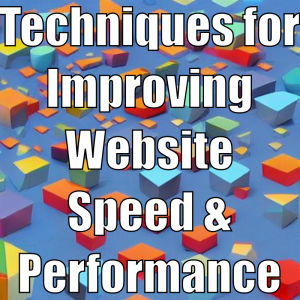 Improving website speed and performance is a crucial factor in maintaining a high search engine ranking and providing a good user experience. A fast website can make all the difference in keeping visitors on your site and reducing bounce rates. This article will discuss the techniques and strategies to improve your website speed and performance.
Improving website speed and performance is a crucial factor in maintaining a high search engine ranking and providing a good user experience. A fast website can make all the difference in keeping visitors on your site and reducing bounce rates. This article will discuss the techniques and strategies to improve your website speed and performance.
Some of these suggestions may seem difficult to those who may not have much website experience. It is important that if you decide to take on any of these suggestions you understand the implications and what could happen if, for example, you make a change that breaks your website.
If you have any concern at all about completing these steps, please don’t hesitate to contact us and let us help.
1: Minimize HTTP Requests
Minimizing HTTP requests is one of the easiest and most effective ways to improve website speed. Every time a browser requests a resource from the server, it takes time to download and process it. The more requests, the longer it takes to load the page. Combining files, such as combining multiple CSS files into one, can reduce the number of requests and improve page speed.
2: Use a Content Delivery Network (CDN)
A Content Delivery Network (CDN) is a network of servers distributed across the globe that delivers website content to users from the server closest to them. This reduces the latency and improves the loading speed. Using a CDN can have a significant impact on website speed, especially for visitors in distant locations.
3: Optimize Images
Images are often the largest files on a web page, and large image files can slow down your website. Optimizing images by compressing them and using appropriate image formats (e.g., JPEG for photographs and PNG for graphics with transparent backgrounds) can significantly reduce page load times.
4: Minimize the use of plugins
Some plugins can slow down your website. It is important to limit the number of plugins you use and choose ones that are well-coded and frequently updated. Poorly-coded plugins can negatively impact website speed, so it is important to choose plugins wisely.
5. Enable Browser Caching
Caching allows the browser to store elements of your website so that they can be quickly loaded the next time a user visits the site, rather than downloading them all over again. This reduces the load on your server and improves website speed. Enabling browser caching can be done through your website’s code or using a caching plugin.
6: Minify HTML, CSS, and JavaScript
Minification removes whitespace and other unnecessary characters from the code, reducing the file size and improving the load time. This can be done through manual optimization or by using a plugin.
7: Reduce the Number of Redirects
Every redirect takes time and adds latency to the page load. Using permanent (301) redirects whenever possible and reducing the number of redirects can significantly improve website speed.
8: Use Lazy Loading
Lazy loading loads images and other elements as they become visible on the user’s screen, rather than loading all elements at once. This significantly improves page load times for users with slow connections.
9: Minimize the Use of Third-Party Scripts
Third-party scripts, such as social media buttons or advertisements, can slow down your website by adding extra latency and processing time. Limit the number of third-party scripts you use and make sure they are well-optimized.
10: Use a Fast Web Hosting Service
Choosing a fast and reliable web hosting service is essential for improving website speed and performance. A web hosting service with fast servers, reliable uptime, and 24/7 support can have a significant impact on website speed.
Conclusion: Which Tool Should You Use?
Improving website speed and performance is essential for providing a good user experience and maintaining a high search engine ranking. By implementing the techniques mentioned above, you can significantly improve website speed and provide a better experience for your visitors. Remember to optimize your website for both desktop and mobile devices, as mobile speed is becoming increasingly important in search engine rankings. With proper optimization, your website will be more competitive in the search rankings and attract more visitors.
As mentioned at the beginning of this article, if any of this seems overwhelming to you, please do not hesitate to contact us and we can make these changes for you.
Let’s Work Together
TELL US MORE ABOUT YOUR PROJECT
Let us help you get your website found. Or, if you simply have a few questions, then fill out the form below and we will get back to you.

